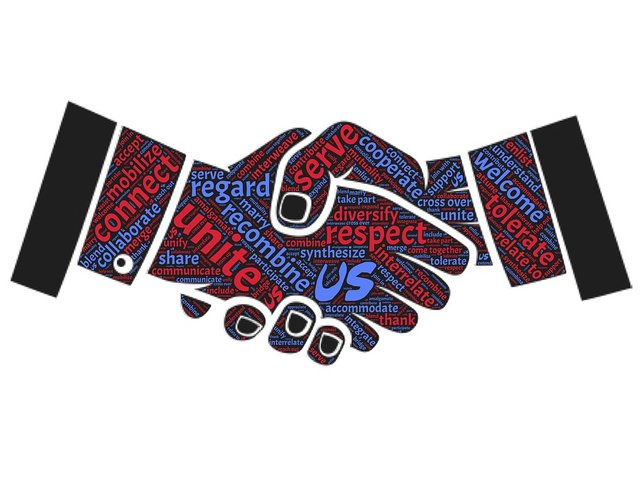The Six Pillars of Self-Esteem - The 6th Pillar: Integrity
This is the seventh and last article from the review of The Six Pillars of Self Esteem by Nathaniel Branden. Until now we talked about:
- General introduction in self-esteem
- The 1st pillar: Living Consciously
- The 2nd pillar: Self-Acceptance
- The 3rd pillar: Self-Responsibility
- The 4th pillar: Self-Expressiveness
- The 5th pillar: Living with Purpose
Today I will review the 6th pillar of self esteem: Integrity

Source: Pixabay
What is personal integrity?
If I will put it visually I imagine integrity to be a circle linking my inside world with the outside. If you want to see a circle having a beginning the start point will be who I am (standards and values), how I express myself (my behavior) and back inside me with a plus on self esteem if what I showed is aligned with who I am and a minus if not.
"When we behave in ways that conflict with our judgement of what is appropriate, we loose face in our own eyes"
The author brings the idea of integrity in the other pillars also. This is because all of them are ideally integrated inside us. If we want to improve our self-esteem and our life we must do it as a whole. why is this a separate pillar? Because there are some specific elements we did not touched until now.
Personal integrity and standards
As we discussed in the post about self-acceptance I cannot change a behavior until I accept it. But how would I know there is something to change?
Standards helps us orienting and evaluate behaviors, ours or other people's. According to them we will validate something as appropriate or not. And if we are appropriate the self-esteem rises.
How do we build our standards?
We set the majority of initial standards in our first years in report with our parents and what we perceive as their standards. for example, a child hears often from his parents that he could have done better. He will set standards so high so he would't be able to achieve those just to validate that he is never enough.
Later, school and society will get us to create new standards. If we have a healthy self-esteem we will evaluate what is good for us when pointing on a new standard, social or moral. We would be able to reevaluate old standards and check if they still apply or needs to be changed.
Could standards do us bad?
Standards could indeed harm us: "Once we see that living up to our standards appears to be leading us toward self-destruction, the time has come to question our standards ".
An example we see now around us is the women fighting to be both family and career oriented. When they want to accomplish both standards they risk physical and mental exhaustion. Sometimes, when they reach this point, they will be able to reevaluate the high standards and find a balance where their needs are also included.
What happens when we fail our standards?
When my behavior is not aligned with my values there are different versions of the story:
1. We feel guilty
A friend, psychologist, was telling me once that we feel guilt in order to silence the internal voice keep telling us we should make things right and correct what we've done wrong. Feeling guilty is also an action which, if not transformed in a correction activity will lead, long term, to a decrease in self-esteem. I've never looked to guilt from that perspective and this made sense.
2. We assume responsibility, accept and correct the behavior or change the standard
This is the healthy wasy to work with any wrong behaviors. Choosing to assume and correct is all about integrity and the impact on self esteem will be a good one even if the mistake was a big one.
3. We self - justify and minimize the mistake in order to match the standard
This is maybe the most dangerous behavior as in time, you will start self-justify bigger and bigger mistakes. Here we can included cases of politicians accepting bribery, first small amounts of many and in the end houses and yachts. If you will ask them, they will honesty consider this an inoffensive behavior. The same for prosecutors falsifying proofs to get convictions.
"Most of the issues of integrity we face are not big issues but small ones, yet the accumulated weight of our choices has an impact on our sense of self"
Personal integrity, congruence and consistency
Something I do aligned with my values once and 5 times not won't contribute to my feeling of personal integrity. To perceive myself and be perceived as an upright person I have to show congruence and consistency, to act the same in report with that standard.
If I look around, the people I admire the most are the ones sending the same message through their actions. This makes me trusting them.
Why should I be the upright person
We see around us people showing a lack of integrity. Apparently, they do fine: socially and financially and we see them not being punished. Sometimes even rewarded.
We are thinking that maybe we can do this things to and choose the easy way through life. What we don't see is that the punishment comes from inside. We know that we were wrong and betrayed our standards and we try to minimize the voice telling this. For the self-esteem this is the only voice that matters. The external ones can sustain but not compensate for or remove it.
The final question: What is more important for me: Self esteem or other benefits?
The series has come to an end. I hope this was useful for the ones reading it. I hope you are curios now to read the book. Feedback is welcomed.